7 dec 2019
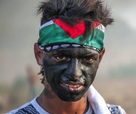
Mystery surrounds the death of Emad Khalil Ibrahim Shahin, 17, who was arrested on November 4, 2018, for breaching the Israeli fence between Gaza and Israel.
Having slipped through Israel’s security fence, Emad Khalil Ibrahim Shahin and his friends sneaked into an abandoned barracks and lit a fire, anxious they were about to be discovered, they fled the scene.
“We ran until we found a sand dune to hide behind on the other side of the fence, but then noticed Emad was not with us. He ran slower because he was on crutches,” described one of his companions, who wished to remain anonymous.
“We saw him on the ground and told him to crawl, but then a military vehicle raced up and a soldier fired at him, shooting him in the right leg, soon a helicopter came and took him away.”
355 days passed before the body of the slain youth was returned to Gaza, on October 23, 2019, in a body bag.
Now his family and several Palestinian and Israeli NGOs are asking why Israel’s military held the body for so long, and how he lost his life after apparently only being shot in the leg.
Symbol of Protest
Shahin was the youngest of nine children, whose father made a small but decent salary as a school janitor.
His sister Monira said the teen was a passionate participant in the Great March of Return protest, much like the rest of his family.
The protests, held every Friday since March 2018, call for Israeli authorities to lift their 11-year blockade on the Gaza Strip and allow Palestinian refugees, nearly 70% of Gaza’s residents, to return to their villages and towns in what is now called Israel.
Once a week, Palestinians can be seen demonstrating all along the fence that separates Israel from the blockaded coastal enclave. Though Israeli forces most commonly target protesters close to the fence, Palestinians much further back have been targeted as well.
Fearful of Israeli snipers, Monira and Shahin’s other relatives have kept relatively clear of the fence during demonstrations. Shahin, however, repeatedly approached the barrier, burning tires for the purpose of blocking the vision of soldiers aiming at protesters.
It was not long before the snipers shot Shahin in the foot, on May 17, 2018.
“He healed quickly,” Monira said, adding that just two weeks later he was back at the protests using crutches.
“When photos of him participating in the protests, despite his injury were widely shared on social media, he felt proud, he saw himself as a symbol of the protest.”
Twenty-one Fridays later, Shahin was shot again, in the same foot, yet still returned to the march.
When he was shot a third time, this time in the other foot, surgeons were forced to amputate three of his toes.
“Our mother tried to stop him from going back, the entire family told him he had done his duty for his country and should rest now,” Monira said.
“But he said he did not fear death, that death is inevitable, and he would rather die for his country, resisting occupation, than in some other way that is pointless.”
Crossing the Line
Limping, and on crutches, on November 1, 2018, Shahin and two friends decided to cross through the fence, trying to reach a vacant Israeli army barracks almost 300 metres inside the fence, his sister described.
She said his goal was to challenge the siege, bringing back a “trophy” like a soldier’s ammunition belt or a jeep licence plate.
Despite the area being heavily militarized and Shahin and his friends reached the compound, breathless and excited, he called his sister as they prepared to leave.
“He wanted to share his triumphant moment, but I shouted at him, ordering him to get out immediately before he was killed, I was terrified,” Monira said.
“When he made it home, my mother was in tears, asking him not to do it again.”
The following Saturday, Shahin woke up early, telling his mother that he was going for a short errand after breakfast, instead, he was returning to the barracks, carrying gasoline.
At 4.30 pm on November 3, 2018, Shahin was shot in the leg near the fence east of central Gaza’s Maghazi refugee camp.
According to eyewitnesses, he was seized by a number of Israeli soldiers, who took him away in a helicopter within 20 minutes of being shot, apparently to the Soroka medical centre in the Negev.
From then, Shahin’s fate is unclear.
Immediately after the teen disappeared, Monira said her family contacted Palestinian and Israeli NGOs, frantically seeking information.
At first, Israeli authorities suggested he had sustained only “moderate” wounds, but the day after he was shot, the Tel Aviv-based NGO Physicians for Human Rights was told Shahin was dead.
For the next few days, Physicians for Human Rights pressed for answers and asked for the medical report on Shahin’s death.
On November 11 , the NGO was told Shahin’s medical records could not be released because his body had not been identified, instead, it was told to contact Israel’s Abu Kabir Forensic Institute.
“I contacted Dr. Maya Hoffman of Abu Kabir, who tried to locate the body without success, so I was referred to a records department,” Physicians for Human Rights’ Ran Yaron stated.
“The records department said no anonymous bodies had been transferred from Soroka, so we assumed the army was holding the body.”
After that, HaMoked, an Israeli human rights organisation, asked the Israeli army for information on Shahin’s body, but no reply was received.
“I don’t understand what Israel did with a body of Palestinian teenager for a year,” Ran Yaron, of Physicians for Human Rights said.
When asked for comment on Shahin’s death and the reasons his body was withheld for almost a year, the Israeli military referred Middle East Eye to the defence ministry.
Once contacted, the defence ministry said it was a matter only the military could comment on.
Death Unexplained
Shahin’s family was devastated to learn about his death.
“We knew he would be imprisoned, but not murdered,” Monira said. In the absence of his body, the family had held on to a small hope that Shahin was actually alive.
When the International Red Cross informed the family that Shahin’s body had arrived at Al-Shifa Hospital in Gaza City, they rushed to see him.
According to Dr. Emad Shihada, the receiving physician, the body had been stored in liquid nitrogen at an extremely cold temperature for a long time.
Lacking the proper equipment to thaw the body, an autopsy, apparently could only have been performed if it had been left in the sun for two days.
Instead, the family preferred to bury him rather than to wait, in accordance with the Islamic tradition that recommends immediate burial after death.
Despite no full autopsy being carried out, Shahin’s family saw several disturbing marks on his body.
From the middle of his chest to his stomach ran a 15-centimetre scar, indicating stitching, and the same pattern could be seen radiating out for 13 centimetres from the left side of his chest on both sides.
The mysterious incisions raised the suspicions of Shahin’s family that his organs had been taken for trafficking, a notorious practice that Israel has attempted to stamp out since 2008.
However, Shihada suggested that it could be possible that the body had been opened by physicians in an attempt to stop internal bleeding.
External examination showed that Shahin had been shot three times in the right leg. If one or more of the bullets severed the femoral artery, causing him to bleed without treatment for more than 15 minutes, that alone could have caused his death, the doctor said.
“Emad was only a boy,” Monira said. “Israel could have treated him after he was abducted, but they did not, they killed him.”
Witholding Bodies
According to the Al-Mezan Centre for Human Rights, Israeli authorities continue to withhold the bodies of 15 Palestinians from the Gaza Strip killed since 30 March 2018, including two children.
Though Shahin’s family waited nearly a year for the 17-year-old’s body to be returned, the other Palestinian families left in limbo may never see their relatives returned.
Last week, Defence Minister Naftali Bennett ordered all bodies of Palestinians held by Israel to be kept from their families as a “deterrent against terrorism”.
Israel is the only country in the world implementing a policy of confiscating remains, using legislation dating back to 1945 during the British Mandate.
Shahin’s death and the threat of Israeli arrest have not scared Monira or her family off from the Great March of Return protests, however.
“Resistance is the only way to liberate our land,” Monira said. “And now we also go to honor Emad, now the whole family is ready to die to defeat the occupier.”
Author: Tareq Hajjaj – author and a member of Palestinian Writers Union. He studied English Literature at Al-Azhar university in Gaza. He started his career in journalism in 2015 working as news writer/translator at local newspaper Donia al-Watan, then writing in both Arabic and English for international outlets such as Elbadi, MEE, and Al Monitor. Now he’s writing for We Are Not Numbers.
Having slipped through Israel’s security fence, Emad Khalil Ibrahim Shahin and his friends sneaked into an abandoned barracks and lit a fire, anxious they were about to be discovered, they fled the scene.
“We ran until we found a sand dune to hide behind on the other side of the fence, but then noticed Emad was not with us. He ran slower because he was on crutches,” described one of his companions, who wished to remain anonymous.
“We saw him on the ground and told him to crawl, but then a military vehicle raced up and a soldier fired at him, shooting him in the right leg, soon a helicopter came and took him away.”
355 days passed before the body of the slain youth was returned to Gaza, on October 23, 2019, in a body bag.
Now his family and several Palestinian and Israeli NGOs are asking why Israel’s military held the body for so long, and how he lost his life after apparently only being shot in the leg.
Symbol of Protest
Shahin was the youngest of nine children, whose father made a small but decent salary as a school janitor.
His sister Monira said the teen was a passionate participant in the Great March of Return protest, much like the rest of his family.
The protests, held every Friday since March 2018, call for Israeli authorities to lift their 11-year blockade on the Gaza Strip and allow Palestinian refugees, nearly 70% of Gaza’s residents, to return to their villages and towns in what is now called Israel.
Once a week, Palestinians can be seen demonstrating all along the fence that separates Israel from the blockaded coastal enclave. Though Israeli forces most commonly target protesters close to the fence, Palestinians much further back have been targeted as well.
Fearful of Israeli snipers, Monira and Shahin’s other relatives have kept relatively clear of the fence during demonstrations. Shahin, however, repeatedly approached the barrier, burning tires for the purpose of blocking the vision of soldiers aiming at protesters.
It was not long before the snipers shot Shahin in the foot, on May 17, 2018.
“He healed quickly,” Monira said, adding that just two weeks later he was back at the protests using crutches.
“When photos of him participating in the protests, despite his injury were widely shared on social media, he felt proud, he saw himself as a symbol of the protest.”
Twenty-one Fridays later, Shahin was shot again, in the same foot, yet still returned to the march.
When he was shot a third time, this time in the other foot, surgeons were forced to amputate three of his toes.
“Our mother tried to stop him from going back, the entire family told him he had done his duty for his country and should rest now,” Monira said.
“But he said he did not fear death, that death is inevitable, and he would rather die for his country, resisting occupation, than in some other way that is pointless.”
Crossing the Line
Limping, and on crutches, on November 1, 2018, Shahin and two friends decided to cross through the fence, trying to reach a vacant Israeli army barracks almost 300 metres inside the fence, his sister described.
She said his goal was to challenge the siege, bringing back a “trophy” like a soldier’s ammunition belt or a jeep licence plate.
Despite the area being heavily militarized and Shahin and his friends reached the compound, breathless and excited, he called his sister as they prepared to leave.
“He wanted to share his triumphant moment, but I shouted at him, ordering him to get out immediately before he was killed, I was terrified,” Monira said.
“When he made it home, my mother was in tears, asking him not to do it again.”
The following Saturday, Shahin woke up early, telling his mother that he was going for a short errand after breakfast, instead, he was returning to the barracks, carrying gasoline.
At 4.30 pm on November 3, 2018, Shahin was shot in the leg near the fence east of central Gaza’s Maghazi refugee camp.
According to eyewitnesses, he was seized by a number of Israeli soldiers, who took him away in a helicopter within 20 minutes of being shot, apparently to the Soroka medical centre in the Negev.
From then, Shahin’s fate is unclear.
Immediately after the teen disappeared, Monira said her family contacted Palestinian and Israeli NGOs, frantically seeking information.
At first, Israeli authorities suggested he had sustained only “moderate” wounds, but the day after he was shot, the Tel Aviv-based NGO Physicians for Human Rights was told Shahin was dead.
For the next few days, Physicians for Human Rights pressed for answers and asked for the medical report on Shahin’s death.
On November 11 , the NGO was told Shahin’s medical records could not be released because his body had not been identified, instead, it was told to contact Israel’s Abu Kabir Forensic Institute.
“I contacted Dr. Maya Hoffman of Abu Kabir, who tried to locate the body without success, so I was referred to a records department,” Physicians for Human Rights’ Ran Yaron stated.
“The records department said no anonymous bodies had been transferred from Soroka, so we assumed the army was holding the body.”
After that, HaMoked, an Israeli human rights organisation, asked the Israeli army for information on Shahin’s body, but no reply was received.
“I don’t understand what Israel did with a body of Palestinian teenager for a year,” Ran Yaron, of Physicians for Human Rights said.
When asked for comment on Shahin’s death and the reasons his body was withheld for almost a year, the Israeli military referred Middle East Eye to the defence ministry.
Once contacted, the defence ministry said it was a matter only the military could comment on.
Death Unexplained
Shahin’s family was devastated to learn about his death.
“We knew he would be imprisoned, but not murdered,” Monira said. In the absence of his body, the family had held on to a small hope that Shahin was actually alive.
When the International Red Cross informed the family that Shahin’s body had arrived at Al-Shifa Hospital in Gaza City, they rushed to see him.
According to Dr. Emad Shihada, the receiving physician, the body had been stored in liquid nitrogen at an extremely cold temperature for a long time.
Lacking the proper equipment to thaw the body, an autopsy, apparently could only have been performed if it had been left in the sun for two days.
Instead, the family preferred to bury him rather than to wait, in accordance with the Islamic tradition that recommends immediate burial after death.
Despite no full autopsy being carried out, Shahin’s family saw several disturbing marks on his body.
From the middle of his chest to his stomach ran a 15-centimetre scar, indicating stitching, and the same pattern could be seen radiating out for 13 centimetres from the left side of his chest on both sides.
The mysterious incisions raised the suspicions of Shahin’s family that his organs had been taken for trafficking, a notorious practice that Israel has attempted to stamp out since 2008.
However, Shihada suggested that it could be possible that the body had been opened by physicians in an attempt to stop internal bleeding.
External examination showed that Shahin had been shot three times in the right leg. If one or more of the bullets severed the femoral artery, causing him to bleed without treatment for more than 15 minutes, that alone could have caused his death, the doctor said.
“Emad was only a boy,” Monira said. “Israel could have treated him after he was abducted, but they did not, they killed him.”
Witholding Bodies
According to the Al-Mezan Centre for Human Rights, Israeli authorities continue to withhold the bodies of 15 Palestinians from the Gaza Strip killed since 30 March 2018, including two children.
Though Shahin’s family waited nearly a year for the 17-year-old’s body to be returned, the other Palestinian families left in limbo may never see their relatives returned.
Last week, Defence Minister Naftali Bennett ordered all bodies of Palestinians held by Israel to be kept from their families as a “deterrent against terrorism”.
Israel is the only country in the world implementing a policy of confiscating remains, using legislation dating back to 1945 during the British Mandate.
Shahin’s death and the threat of Israeli arrest have not scared Monira or her family off from the Great March of Return protests, however.
“Resistance is the only way to liberate our land,” Monira said. “And now we also go to honor Emad, now the whole family is ready to die to defeat the occupier.”
Author: Tareq Hajjaj – author and a member of Palestinian Writers Union. He studied English Literature at Al-Azhar university in Gaza. He started his career in journalism in 2015 working as news writer/translator at local newspaper Donia al-Watan, then writing in both Arabic and English for international outlets such as Elbadi, MEE, and Al Monitor. Now he’s writing for We Are Not Numbers.
6 dec 2019
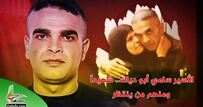
The Israeli occupation authorities on Friday handed over the body of the Palestinian detainee Sami Abu Diyak to Jordan, according to the Palestinian Detainees and Ex-Detainees Affairs Commission.
Head of the Palestinian Detainees and Ex-Detainees Affairs Commission, Qadri Abu Baker, said that the Israeli authorities returned Abu Diyak's body, upon the request of his family, through Allenby Bridge.
Abu Baker noted that his commission had asked the Israeli authorities to hand them over Abu Diyak's body but the latter rejected.
Abu Diyak, 36, died while in Israeli custody on 26 November, following 17 years of detention, due to cancer and other serious health problems as well as deliberate medical negligence by the Israel Prison Service.
Abu Diyak was the fifth Palestinian detainee to die in Israeli jails as a result of torture or medical neglect in 2019.
Head of the Palestinian Detainees and Ex-Detainees Affairs Commission, Qadri Abu Baker, said that the Israeli authorities returned Abu Diyak's body, upon the request of his family, through Allenby Bridge.
Abu Baker noted that his commission had asked the Israeli authorities to hand them over Abu Diyak's body but the latter rejected.
Abu Diyak, 36, died while in Israeli custody on 26 November, following 17 years of detention, due to cancer and other serious health problems as well as deliberate medical negligence by the Israel Prison Service.
Abu Diyak was the fifth Palestinian detainee to die in Israeli jails as a result of torture or medical neglect in 2019.
5 dec 2019
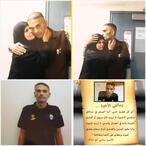
The family of prisoner Sami Abu Diak, who recently died from cancer while in Israeli custody, called on human rights and humanitarian institutions to promptly intervene, the Palestinian News and Info Agency (WAFA) reported.
The family appealed to human rights and humanitarian organizations to pressure the Israeli authorities to release the deceased prisoner’s body for burial, and not to withhold his body in mortuary fridges or bury him in the ‘cemeteries of numbers’.
Abu Diak’s father, ‘Ahed, stressed the need to act during a meeting with Deputy Mayor of Jenin, Kamal Abu al-Rub, before the Israeli court makes a decision regarding his son’s body.
He said that his family is going through a difficult time following the death of their son due to medical negligence by the Israeli Prison Service. The Deputy Mayor affirmed continued efforts with relevant authorities to ensure the continuation of popular events demanding the release of Abu Diak’s body.
The National Campaign for Retrieval of the Bodies of Palestinian and Arab War Victims held by Israel, stated in an open letter, sent to the United Nations Secretary-General, Antonio Guterres on September 5, said that since 1967, Israel has applied an inconsistent policy of refusing to deliver the mortal remains of hundreds of Palestinian combatants to their families.”
The dead were buried in what Israel refers to as “cemeteries for enemy combatants,” in mass clandestine graves located in areas designated as closed military zones and referred to as “cemeteries of numbers,” since the deceased are buried there anonymously with numbers etched onto metal placards attached to their remains.
The family appealed to human rights and humanitarian organizations to pressure the Israeli authorities to release the deceased prisoner’s body for burial, and not to withhold his body in mortuary fridges or bury him in the ‘cemeteries of numbers’.
Abu Diak’s father, ‘Ahed, stressed the need to act during a meeting with Deputy Mayor of Jenin, Kamal Abu al-Rub, before the Israeli court makes a decision regarding his son’s body.
He said that his family is going through a difficult time following the death of their son due to medical negligence by the Israeli Prison Service. The Deputy Mayor affirmed continued efforts with relevant authorities to ensure the continuation of popular events demanding the release of Abu Diak’s body.
The National Campaign for Retrieval of the Bodies of Palestinian and Arab War Victims held by Israel, stated in an open letter, sent to the United Nations Secretary-General, Antonio Guterres on September 5, said that since 1967, Israel has applied an inconsistent policy of refusing to deliver the mortal remains of hundreds of Palestinian combatants to their families.”
The dead were buried in what Israel refers to as “cemeteries for enemy combatants,” in mass clandestine graves located in areas designated as closed military zones and referred to as “cemeteries of numbers,” since the deceased are buried there anonymously with numbers etched onto metal placards attached to their remains.
1 dec 2019
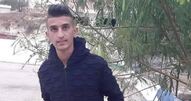
A general strike has been staged in Beit Awwa village in the West Bank province of al-Khalil in protest at Israeli occupation forces' killing of 18-year-old Badawi al-Masalma on Saturday night.
Shops, schools and several institutions closed their doors as part of the strike, while Israeli occupation forces deployed in large numbers around the village.
Israeli forces further installed makeshift barriers at the entrances to different villages in al-Khalil and restricted the movement of Palestinian citizens.
On Friday night Israeli occupation forces opened fire at a group of Palestinian youths in Beit Awwa, for allegedly throwing Molotov cocktails at Israeli military jeeps, instantly killing one of them. He was later identified as Badawi al-Masalma.
Israeli forces have not handed over al-Masalma's body to his family for burial yet.
Shops, schools and several institutions closed their doors as part of the strike, while Israeli occupation forces deployed in large numbers around the village.
Israeli forces further installed makeshift barriers at the entrances to different villages in al-Khalil and restricted the movement of Palestinian citizens.
On Friday night Israeli occupation forces opened fire at a group of Palestinian youths in Beit Awwa, for allegedly throwing Molotov cocktails at Israeli military jeeps, instantly killing one of them. He was later identified as Badawi al-Masalma.
Israeli forces have not handed over al-Masalma's body to his family for burial yet.
28 nov 2019
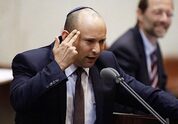
The chairman of the Palestinian Prisoners’ Affairs Commission, Qadri Abu Baker, today, slammed Israeli Defense Minister Naftali Bennett’s order to withhold the bodies of all alleged Palestinian assailants and to not return any of them to their families for burial.
Abu Baker stated that Bennett’s order is “contaminated with the stench of hatred and extremism” and “demonstrates yet again that Israel is a terrorist entity which relishes taking revenge against the families of alleged Palestinian assailants.”
According to WAFA correspondence, he urged the world to take a clear position to confront this “usurping entity”- in reference to Israel – “that proves every day that it is a terrorist entity that persists in its criminal acts against the Palestinian people.”
A statement by Bennett’s office said that the bodies will not be released in all cases, regardless of the faction the alleged assailant is affiliated with and regardless of the alleged attack they committed or attempted to commit. The order requires an approval from the Israeli security cabinet.
Archive IMEMC post 05/17/15 Bennett Wants to See Palestinians Become ‘Water Carriers and Wood Hewers’ for Jews
Abu Baker stated that Bennett’s order is “contaminated with the stench of hatred and extremism” and “demonstrates yet again that Israel is a terrorist entity which relishes taking revenge against the families of alleged Palestinian assailants.”
According to WAFA correspondence, he urged the world to take a clear position to confront this “usurping entity”- in reference to Israel – “that proves every day that it is a terrorist entity that persists in its criminal acts against the Palestinian people.”
A statement by Bennett’s office said that the bodies will not be released in all cases, regardless of the faction the alleged assailant is affiliated with and regardless of the alleged attack they committed or attempted to commit. The order requires an approval from the Israeli security cabinet.
Archive IMEMC post 05/17/15 Bennett Wants to See Palestinians Become ‘Water Carriers and Wood Hewers’ for Jews
27 nov 2019
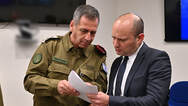
Defense minister issues new directive halting release of bodies of Palestinian terrorists for burial; decision to be brought for Security Cabinet's approval
Defense Minister Naftali Bennett instructed security authorities on Wednesday to halt any future release of bodies of terrorists held by Israel, regardless of which terrorist organization the person was affiliated with.
The decision was made after a round of consultations with senior security officials. According to Bennett's new directive, exceptional cases, such as the return of the bodies of minor terrorists, will only be approved at the defense minister's discretion.
The new policy requires the approval of the Security Cabinet and will be presented before it soon.
"The request for a change in policy was made by the family of [slain IDF soldier held in Gaza by Hamas] Hadar Goldin during their meeting with Prime Minister Benjamin Netanyahu last week," said a senior security official. "Netanyahu expressed willingness to change the policy and instructed security authorities to look into the issue."
So far, Israel only kept holding the bodies of Hamas militants or other individuals affiliated with the terror group. Israel also continues to hold the bodies of terrorists who carried out serious attacks on Israeli civilians and troops.
The rest of the bodies are returned gradually to Palestinian hands, usually on Friday evenings, when public attention in Israel is not directed to it.
In the past, Israel returned the bodies of terrorists to prevent escalations in violence, but terrorist funerals have become a breeding ground for violence and incitement against Israel as mourners regularly call for vengeance on Israel.
Goldin's family lauded on Wednesday Bennet's decision to change the policy.
"We back the defense minister's decision," said the family. "It is inconceivable to continue releasing dead or living terrorists while the soldiers are held in Hamas's hands."
The release of terrorists is a prize that we cannot give Hamas while they're still holding soldiers and civilians."
"Prime Minister Netanyahu has committed to condition any agreement on the matter on the boys' return home and we expect the cessation of any economic or civilian projects in the Gaza Strip as long as the boys are still held in Gaza."
The bodies of IDF soldiers Goldin and Oron Shaul have been held in the Gaza Strip by Hamas since 2014.
Defense Minister Naftali Bennett instructed security authorities on Wednesday to halt any future release of bodies of terrorists held by Israel, regardless of which terrorist organization the person was affiliated with.
The decision was made after a round of consultations with senior security officials. According to Bennett's new directive, exceptional cases, such as the return of the bodies of minor terrorists, will only be approved at the defense minister's discretion.
The new policy requires the approval of the Security Cabinet and will be presented before it soon.
"The request for a change in policy was made by the family of [slain IDF soldier held in Gaza by Hamas] Hadar Goldin during their meeting with Prime Minister Benjamin Netanyahu last week," said a senior security official. "Netanyahu expressed willingness to change the policy and instructed security authorities to look into the issue."
So far, Israel only kept holding the bodies of Hamas militants or other individuals affiliated with the terror group. Israel also continues to hold the bodies of terrorists who carried out serious attacks on Israeli civilians and troops.
The rest of the bodies are returned gradually to Palestinian hands, usually on Friday evenings, when public attention in Israel is not directed to it.
In the past, Israel returned the bodies of terrorists to prevent escalations in violence, but terrorist funerals have become a breeding ground for violence and incitement against Israel as mourners regularly call for vengeance on Israel.
Goldin's family lauded on Wednesday Bennet's decision to change the policy.
"We back the defense minister's decision," said the family. "It is inconceivable to continue releasing dead or living terrorists while the soldiers are held in Hamas's hands."
The release of terrorists is a prize that we cannot give Hamas while they're still holding soldiers and civilians."
"Prime Minister Netanyahu has committed to condition any agreement on the matter on the boys' return home and we expect the cessation of any economic or civilian projects in the Gaza Strip as long as the boys are still held in Gaza."
The bodies of IDF soldiers Goldin and Oron Shaul have been held in the Gaza Strip by Hamas since 2014.
31 oct 2019
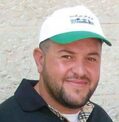
Mesbah Abu Sbeih
Israeli Prosecution informed today attorney of the Commission of Detainees and Ex-Detainees Affairs, Mohammad Mahmoud, that they intend to bury the withheld bodies of martyrs Mesbah Abu Sbeih and Fadi Qanbar in what is known as “numbered cemeteries” during the next few days.
Israeli Prosecution informed today attorney of the Commission of Detainees and Ex-Detainees Affairs, Mohammad Mahmoud, that they intend to bury the withheld bodies of martyrs Mesbah Abu Sbeih and Fadi Qanbar in what is known as “numbered cemeteries” during the next few days.
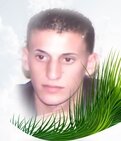
Fadi Qanbar
The commission in statement said the Israeli prosecution will inform the attorney and the martyrs’ families of the numbers of their graves.
The commission condemned, in the strongest terms this “barbaric policy”, saying that this racist and extremist decision, which reek of terrorism and hatred, came in line with the decision of the so-called Israeli Supreme Court issued two months ago, which allows the Israeli authorities to continue to withhold the bodies of martyrs in violation of human rights and foundations of international law.
Sbaih was killed by Israel in 2016 after his alleged involvement in a shooting attack that killed two Israeli soldiers in Jerusalem, while Qanbar was killed in 2017 after an alleged truck ramming attack that left four soldiers killed in Jerusalem.
The National Campaign for Retrieval of the Bodies of Palestinian and Arab War Victims held by Israel in an open letter sent to United Nations Secretary-General Antonio Guterres on September 5, said that since 1967, Israel has applied an inconsistent policy of refusing to deliver the mortal remains of hundreds of Palestinian combatants to their families.”
The dead were buried in what Israel refers to as “cemeteries for enemy combatants,” in mass clandestine graves located in areas designated as closed military zones and referred to as “cemeteries of numbers,” since the deceased are buried there anonymously with numbers etched onto metal placards attached to their corpses or remains.
The commission in statement said the Israeli prosecution will inform the attorney and the martyrs’ families of the numbers of their graves.
The commission condemned, in the strongest terms this “barbaric policy”, saying that this racist and extremist decision, which reek of terrorism and hatred, came in line with the decision of the so-called Israeli Supreme Court issued two months ago, which allows the Israeli authorities to continue to withhold the bodies of martyrs in violation of human rights and foundations of international law.
Sbaih was killed by Israel in 2016 after his alleged involvement in a shooting attack that killed two Israeli soldiers in Jerusalem, while Qanbar was killed in 2017 after an alleged truck ramming attack that left four soldiers killed in Jerusalem.
The National Campaign for Retrieval of the Bodies of Palestinian and Arab War Victims held by Israel in an open letter sent to United Nations Secretary-General Antonio Guterres on September 5, said that since 1967, Israel has applied an inconsistent policy of refusing to deliver the mortal remains of hundreds of Palestinian combatants to their families.”
The dead were buried in what Israel refers to as “cemeteries for enemy combatants,” in mass clandestine graves located in areas designated as closed military zones and referred to as “cemeteries of numbers,” since the deceased are buried there anonymously with numbers etched onto metal placards attached to their corpses or remains.
27 sept 2019
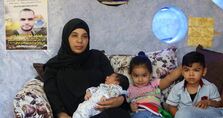
The Israeli occupation forces on Friday returned the body of the Palestinian martyr Mohammed Adawi, 36, to his family after eight months of detention.
Local sources said that Palestinian medical crews were handed over Adawi's body at a checkpoint west of Nablus City.
Adawi was killed by Israeli forces on 21 January for allegedly attempting a stabbing attack at Huwara checkpoint, south of Nablus City.
Adawi is a father of three children: Jumana, 4, Omar, 3, and Mohammed, who was born after his death and named after him.
Local sources said that Palestinian medical crews were handed over Adawi's body at a checkpoint west of Nablus City.
Adawi was killed by Israeli forces on 21 January for allegedly attempting a stabbing attack at Huwara checkpoint, south of Nablus City.
Adawi is a father of three children: Jumana, 4, Omar, 3, and Mohammed, who was born after his death and named after him.
